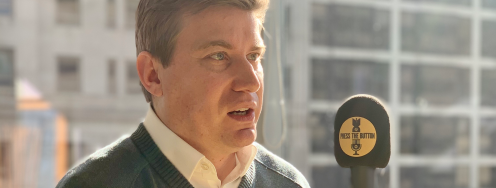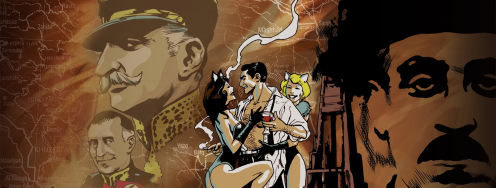Bold Claims but Too Little Action on Arms Control Agenda
On the radar: Nuclear spending spree; Marathon talks ahead for final deal; How the U.S.-Iran relationship has changed since “Argo,” and Iranian filmmakers are criticized by hardliners.
November 3, 2014 | Edited by Will Saetren and Geoff Wilson
Good work left undone- “A recent skewering by the Federation of American Scientists details how Mr. Obama, despite calling repeatedly for ‘a world without nuclear weapons,’ has reduced the size of the nation’s atomic stockpile far less than did any of his three immediate predecessors, including both Presidents Bush,” writes William J. Broad for The New York Times.
--“Critics are calling out the president not only for modest cuts but also for spending more than previous administrations to modernize the remaining arms and for authorizing a new generation of weapon carriers. They call the upgrades an enormous waste of money, citing estimates that put the nation’s costs over the next three decades at up to a trillion dollars.” While Mr. Obama’s policies of atomic modernization “in the long run” could result in more reductions, Hans M. Kristensen of the Federation of American Scientists notes, these policies would reduce the arsenal only “well after President Obama has left office.”
--“Mr. Obama should ‘suspend plans to develop a new arsenal,’ Joe Cirincione, president of the Ploughshares Fund, wrote recently in an op-ed article in the Los Angeles Times. He argued that the move would save money and advance global security. ‘Unless something is done soon,’ he wrote, ‘we will buy thousands of new hydrogen bombs and mount them on hundreds of new missiles and planes.’” Full story here. http://nyti.ms/1A4RaWl
Final steps - “The schedule for the final weeks of Iran nuclear deal negotiations was announced Oct. 31 as US and Israeli officials signaled that they saw increasing odds that a deal may be reached next month,” writes Laura Rozen for Al-Monitor. “European Union foreign policy chief Catherine Ashton will meet political directors from the P5+1 — the five permanent members of the UN Security Council plus Germany — in Vienna on Nov. 7.”
--“Then Ashton, US Secretary of State John Kerry and Iranian Foreign Minister Mohammad Javad Zarif will hold two days of trilateral meetings in Muscat, Oman, on Nov. 9-10. It is Oman that hosted secret talks between the United States and Iran that helped lead to the interim nuclear deal reached in Geneva in November 2013. Marathon final deal talks involving Iran and the P5+1 to try to close the comprehensive deal will get underway in Vienna starting Nov. 18, the EU said.” Full report here. http://bit.ly/1s2jYFX
PMD won’t derail negotiations - “Yukiya Amano, director general of the International Atomic Energy Agency (IAEA), told Al-Monitor Oct. 31 that Iran’s halting cooperation so far in explaining possible military-related nuclear work would not derail ongoing negotiations on a long-term nonproliferation agreement,” writes Barbara Slavin for Al-Monitor. Amano said that “he was not surprised that cooperation had slowed as negotiators from the five permanent members of the UN Security Council plus Germany (P5+1) enter the endgame in talks that currently have a Nov. 24 deadline.”
--“‘Now is not the best time to make progress,’ Amano acknowledged in response to another question from Al-Monitor. ‘I continue to hope this issue of possible military dimensions will be clarified as soon as possible. It is the intention of Iran and it is the intention of the IAEA.’” Overall, “the impression the former Japanese diplomat conveyed was that the process, while slow-moving, shows promise. At some point, Amano said, he will bring his findings to the board of governors of the IAEA, which will make a decision about whether to close the file.” Full story here. http://bit.ly/10GiP0d
Tweet - @BulletinAtomic: Israeli nuclear weapons, 2014 Our latest Nuclear Notebook is out! #Israel #nukes http://bit.ly/1wYMflU
Rebuilding after “Argo” - “Next Tuesday is not just Election Day. It is the thirty-fifth anniversary of the start to the Iran Hostage Crisis, an event that still casts a long shadow on U.S. relations with Iran today.” writes Ploughshares Fund’s Blake Narendra in an op-ed for The Hill. “However, U.S. negotiators in Vienna are working around the clock to test the hypothesis that Iran is willing to chart a new course, with the first big step being the closing off of Iran’s pathways to a nuclear bomb.”
--“The bold approach to re-imagine a new relationship with Iran has its fair share of critics. But the same voices that criticized President Obama as ‘naive’ in daring to engage with Iran also blasted the interim agreement last November as on par with Neville Chamberlain’s ‘appeasement’ of Hitler. The president’s naysayers are still defiantly unmoved even in the face of overwhelming evidence that Iran faithfully executed its terms of the interim deal. Fortunately, not even knee-jerk opponents of diplomacy can hold a nuclear breakthrough hostage to maximalist demands.”
--“United States negotiators have regularly met with their Iranian counterparts over the past year. This was inconceivable for the thirty-years before Obama called Iranian President, Hassan Rouhani, last year.” In addition to slowing Iran’s nuclear program, “these bilateral exchanges have also built a platform where the U.S. and Iran can talk about other areas on other common interest – including countering the Islamic State and stabilizing Afghanistan... Closing Iran’s nuclear dossier would serve as a shot in the arm for the global nonproliferation regime… and would greatly reduce the threat of Iran’s program and the future spread of nuclear weapons.” Full piece here. http://bit.ly/1qhBq8Q
Tweet - @38NorthNK: .@ArmsControlWonk geolocates, analyzes DPRK June 26 & Aug 14 #missile launches: http://bit.ly/1x1HOFY
Hardliners slam Iranian filmmakers - “As part of a broader charm offensive toward the outside world, Iran’s government last month enlisted six of the country’s top filmmakers to help persuade the West to give Iran more lenient terms in negotiations over its nuclear program. The public relations campaign made a big splash abroad. At home, critics savaged it,” write Ramin Mostaghim and Paul Richter for The Los Angeles Times.
--“On an English-language website, No2NoDeal.com, and on social media such as Twitter and Facebook, the filmmakers argue that the West should be flexible because ‘there is no deal that’s worse than no deal.’ Only with an agreement, they contended in a signed statement, can the West prevent Iran from adding new nuclear facilities or uranium-enriching centrifuges or, more important, from gaining bomb-making capability.” Read the full story here. http://lat.ms/1GfowCs
Quick Hits: -
--“Seeing a New Future for French Nuclear Site, After the Toxic Dust Has Settled,” by Patrick Revell for The New York Times. http://nyti.ms/1tToAlU
--“Wondering What the U.S. Air Force’s Secretive Spaceplane Can Do? History Offers Clues,” by Scott Lowther for War is Boring. http://bit.ly/1A4KK9t
--“The U.S. Military is Working on Nuclear Batteries,” by Steve Weintz for War is Boring. http://bit.ly/1wrMBlh
Events:
--“Charting the Navy’s Future in a Changing Maritime Domain," featuring Adm. Jonathan Greenert, Chief of Naval Operations. Nov 4. 9:00-10:00 a.m. at the Brookings Institution, Falk Auditorium, 1775 Massachusetts Ave, NW, Washington. RSVP online. http://bit.ly/1ty1UsI
--“Combatting Illegal Nuclear Trade” featuring Leonard Spector and Egle Murauskaiteat on November 7 from 10:00-11:45 a.m. at the James Martin Center for Nonproliferation Studies. Located at 1400 K St. NW, Suite 1250, Washington DC. RSVP online.http://bit.ly/1x0rUed
--“The Impact & Implications of Iranian Nuclear Weapons on U.S. & Regional Security” featuring Robert Gallucci, Georgetown University on November 10 from 6:00-8:00 p.m. Sponsored by Johns Hopkins University. Located at the Marriott Residence Inn Pentagon City, 550 Army Navy Drive, Arlington, VA. RSVP online. http://bit.ly/1tyAAc5
--“Prospects for a Nuclear Agreement with Iran," featuring Robert Litwak, Wilson Center; Mark Mazzetti, New York Times; and Jay Solomon, Wall Street Journal. Nov. 12 3:00-4:30 p.m.,Wilson Center, Sixth Floor, Reagan Building, 1300 Pennsylvania Ave. NW, Washington. RSVP online http://bit.ly/1wYWRkI
--“Radioactive Knowledge: State Control of Scientific Information in Post-Soviet Kazakhstan," featuring Magdalena Stawkowski, Stanford University. Nov. 13, 3:30-5:00 p.m. Stanford University, CISAC Conference Room, Encina Hall Central, Second Floor, 616 Serra St., Palo Alto, CA. RSVP online. http://stanford.io/1wkOxf8
--“Eyes on North Korea: Threats from the Hermit Kingdom," featuring Mark Tokola, former deputy chief of mission, U.S. Embassy in South Korea; Bruce Klingner, former CIA deputy division chief for Korea; Fred Fleitz, former CIA analyst; and Bruce Bechtol, former senior intelligence analyst, Defense Intelligence Agency. Nov. 20, Noon-1:30 p.m., International Spy Museum, 800 F St. NW, Washington. Tickets are $12. http://bit.ly/1tMxkvw
--Friends Committee on National Legislation, annual meeting. Nov. 22-23. Washington Plaza Hotel, 10 Thomas Circle NW, Washington, and on Capitol Hill. Register online. http://bit.ly/1zRq30A



